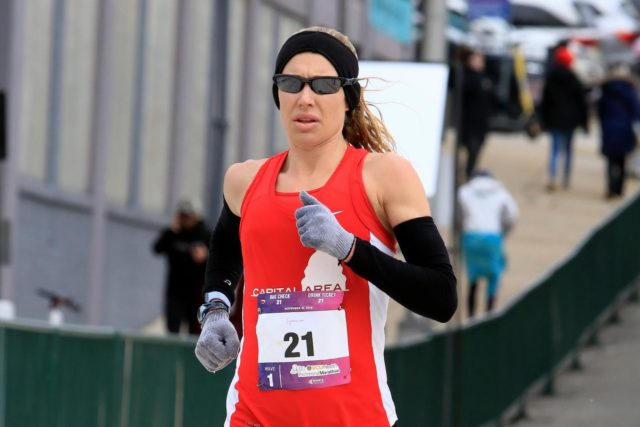
Running is typically a choice for Susanna Sullivan. It’s been her sport since she was at George Mason High School and her hobby even longer.
But as the October sunset started to overtake her in Maine’s Acadia National Park, the darkness forced her close to her race pace, or else she was going to be in trouble. She had finished up a hard run on the hilly dirt roads she is so fond of and stopped to report back to her coach, George Buckheit.
“I was in a national park by myself and it was getting pitch-black,” she said. “I was planning to walk back to my car when I was done, but I just had to run harder than I had for the workout.”
Light was fading fast, but by the time she was safely back to the car, she welcomed back a sensation she hadn’t felt in years. And she certainly hadn’t felt it in the six weeks she had been running on land consistently.
“I felt amazing,” she said. “For the first time I felt like I was really on the right track.”
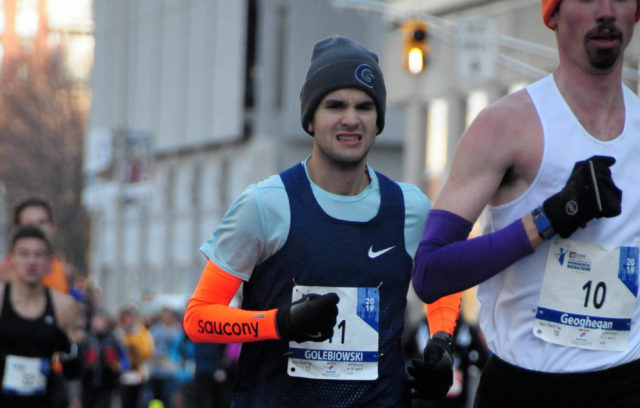
Maybe if he had gotten out of his own head earlier, all those races on the track would have been more fun for D.C.’s Nick Golebiowski.
Or maybe the oval, or the grass for that matter, was never the place for him. Either way, at 24, he knows what it can take others years to figure out — he’s a marathoner. If the love of the training hadn’t been clear enough, he got objective feedback when he ran his first marathon in 2:18:39 two weeks ago at Indianapolis’ Monumental Marathon, qualifying him for the Olympic Marathon Trials.
Learning from the injuries and inconsistency that plagued his early years at Georgetown culminated in the mental breakthrough that he punctuated with a Big East championship in the 10,000 meters his senior year. He continued his career in grad school at the University of North Carolina, but immediately moved to the roads after he didn’t make the first round of the NCAA Championships.
“Not making regionals opened up the possibilities of the roads,” Golebiowski said. “If I had advanced, maybe I would have tried to run faster on the track.”
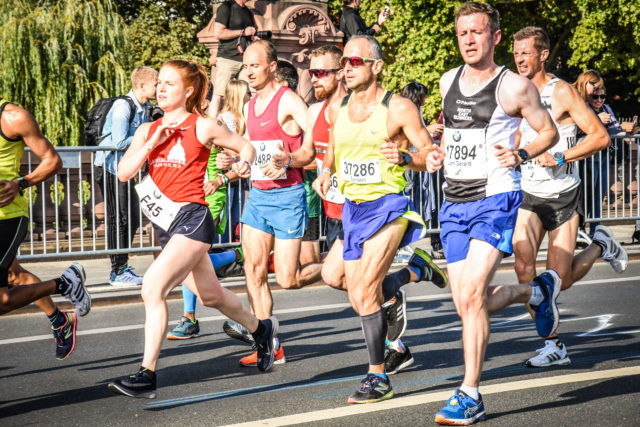
For four years in New York, Jillian Pollack seemed to be throwing her time, energy and sweat into a hole the size of a skyscraper foundation.
It wasn’t wasted – she met her best friends as a runner for Columbia University – but running wasn’t the same as when she was a star a Winchester’s Millbrook High School.
When she came back five years later to run the New York City Marathon, she got the payoff she had been working toward years before, one that put the Olympic Marathon Trials standard squarely in her view.
“I enjoyed running there and I made my best friends there, but college running didn’t go well,” she said. “I never made a conference meet, but I loved the sport.”
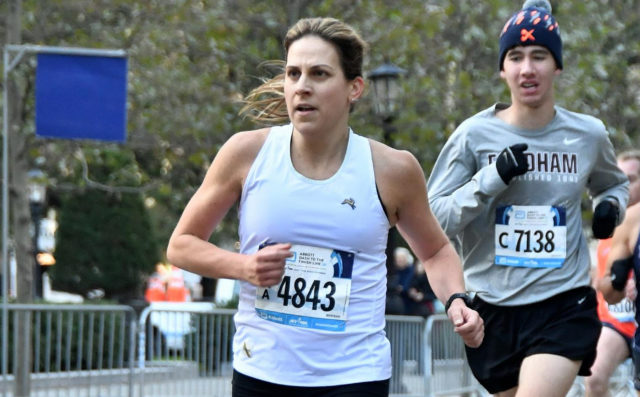
Jessica McGuire didn’t qualify for the Olympic Marathon Trials on raw talent. It took hard work.
That’s according to her coach, Jerry Alexander, who coaches the Northern Virginia Running Club.
“She has maximized her ability like no other athlete I’ve ever worked with,” he said.
Alexander didn’t initially think that running an Olympic Marathon Trials qualifying time of 2:45 or below was realistic. McGuire was able to bring her personal record, then 3:13, down to 2:55 at the 2016 Chicago Marathon. But even from there, qualifying for the Trials would still mean getting her time down by more than 10 minutes.
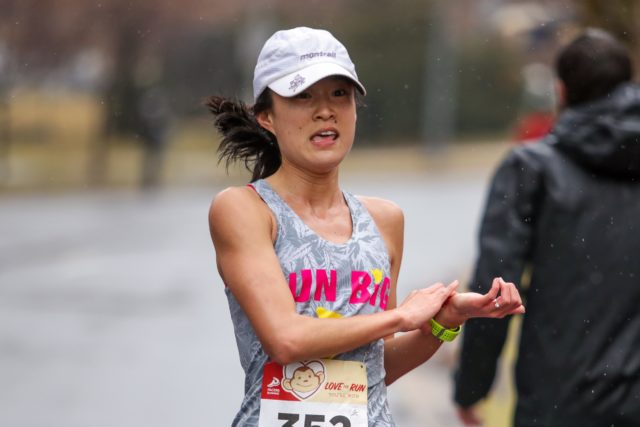
Caitlyn Tateishi is the type of runner who is never satisfied.
She ran her first marathon in June 2015, finishing in 3:38:49, a few minutes above her Boston qualifying time. It didn’t take long for her to sign up for another one — and three months later, she qualified for Boston by more than 15 minutes.
When she ran 3:00:43 at Boston in 2016, she earned a new personal record but said she was still disappointed. She won the Baltimore Marathon later that year with a time of 2:55:42.
Tateishi’s drive to get faster led her to a U.S. Olympic Marathon Trials qualifying time.
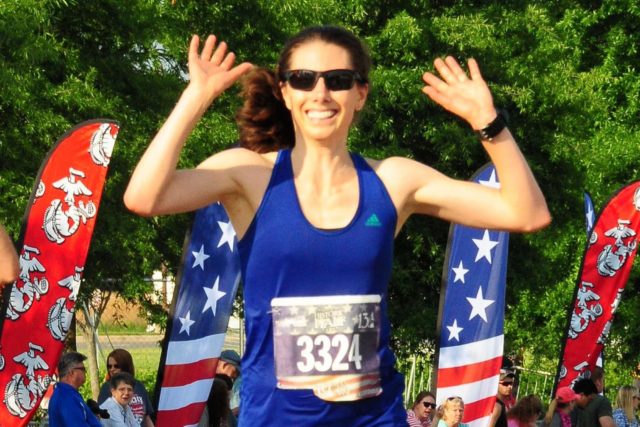
For Shauneen Werlinger, a trip to the 2020 Olympic Marathon Trials figured to be the culmination of a long development that started at Thomas Jefferson High School, continued through a spectacular collegiate career and evolved to include her career and family.
But instead of competing in Atlanta, she’ll be following the race alongside her husband and children. Instead of growing the Trials field by one, she’s growing her family by one, with a son due in January.
The decision to pass on the race is one Werlinger, 34, said she did not take lightly.
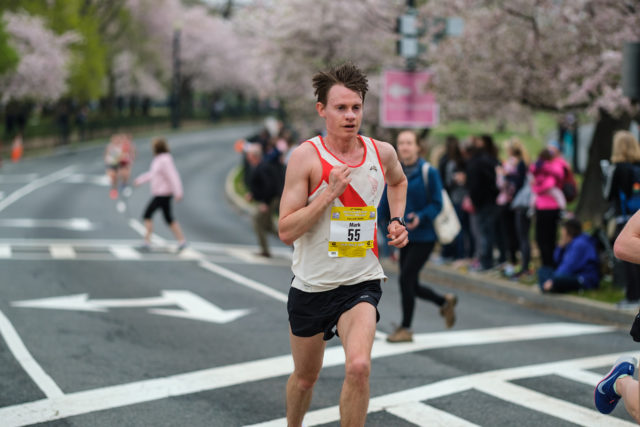
Mark Leininger did a lot while in D.C., including breaking the American University 10,000-meter record. But running off the track, at the Credit Union Cherry Blossom Ten Mile Run, spurred him to greater heights and longer distances.
“I didn’t really think about [competing post-collegiately on the roads] too much,” Leininger said. “I wanted to still run faster on the track.”
What made me consider it was when I ran Cherry Blossom right after college and I ran 49:08, and that’s on pace if I were to continue for a half marathon to qualify. After I did that, I thought about running a half-marathon to qualify [for the Trials]. [Cherry Blossom] was my longest race just coming out of college, and it made me realize I could probably run a pretty fast half-marathon.”
Since his breakout performance, Leininger has expanded his range and competed in the marathon in the 2016 Olympic Trials. And thanks to a career-best performance of 2:17:51 at the California International Marathon last December and a 2:18:00 six months later at Grandma’s Marathon, Leininger is headed back once again to American running’s biggest stage, where he hopes to build off his past Trials experience and surpass the competition.
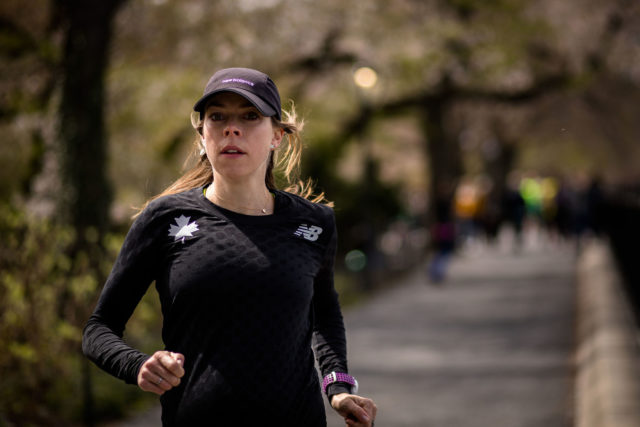
When Aileen Barry was a lacrosse player for Watkins Mills High School in Gaithersburg, she knew she was quick on her feet.
If she got the ball, “no one could catch me,” Barry remembered.
It was the first sign that the Montgomery Village native, now 37, had a hidden talent for running. But it wasn’t something she paid much attention to back then, instead concentrating on ballet and field hockey in addition to lacrosse.
Fast forward to 2018, when Barry punched her ticket to the 2020 Olympic Trials at Grandma’s Marathon in Duluth, Minn. She finished in 2:44:49, 11 seconds under the 2:45 standard for women (her gun time was 2:44:51, which is what U.S.A. Track and Field accepts for its qualifying standards.)
“It was close,” said Barry, who now lives in Manhasset, N.Y. on Long Island. “Grandma’s was an amazing experience. I honestly didn’t know what to expect. At mile 24, would I totally blow up?”
Instead, she passed two other women in the last mile.
Barry’s OTQ came as little surprise to her coach, Devon Martin, who has been working with Barry since she joined the Central Park Track Club in 2006.
“Six weeks before the marathon, I knew she was ready,” Martin said.
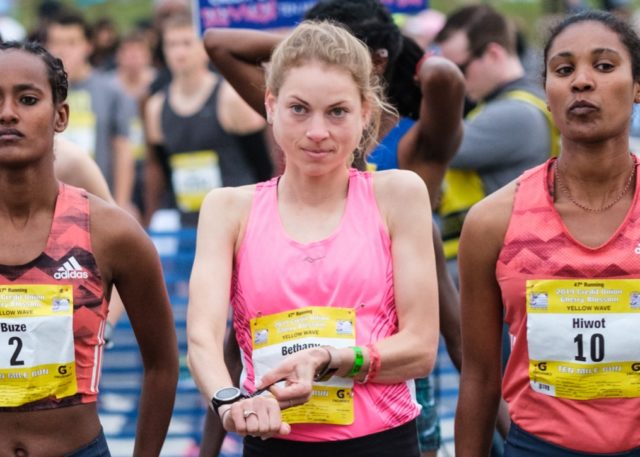
Spot her two letters and Fairfax’s Bethany Sachtleben can rearrange her name to spell “schedule.”
Her daily routine dictates how she fits in her 100+ mile weeks around her full-time work and coaching, but even farther removed from that, she was trying to figure out where all those miles were going. Yes, the 2020 Olympic Marathon Trials Feb. 29, but more immediately, she was supposed to race a marathon on July 27. For Team USA.
But less than a week before she was due in Lima, Peru, she wasn’t so sure. Told in early June that she was on the Pan American Games team, she was now apparently off. She found out on Friday; Her flight was the next Wednesday.
“I heard, ‘we’re offering your spot to everyone on the 2019 (performance) list,'” Sachtleben said. Her last marathon was a month before 2019 started. Everyone else would have to decline, including runners whose times were slower. “Then I started getting calls from friends saying they had been offered my spot and they turned it down. I felt awkward and uncomfortable for everybody because it’s a huge opportunity, but nobody is going to decide to jump into a marathon the week before.”
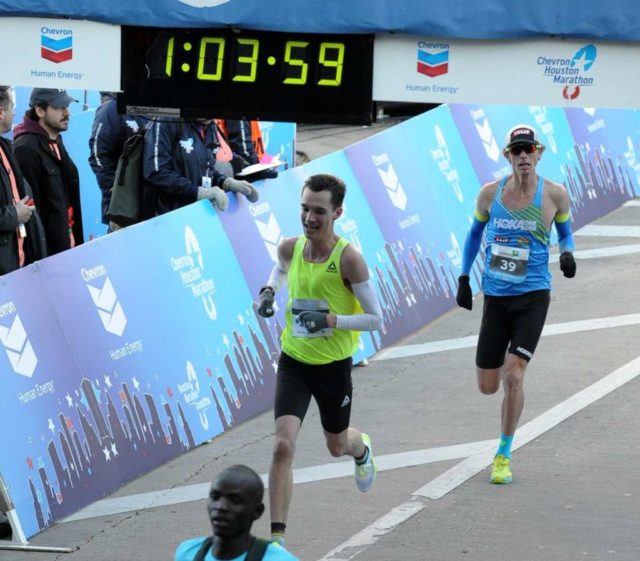
If Chase Weaverling didn’t think he was going to qualify for the US Olympic Marathon Trials before starting the Houston Half Marathon, it definitely didn’t help his confidence when he hit the ground a half mile into the race. He clipped the heels of a marathoner he was drafting off of, then stumbled once that the marathoner went down.
Weaverling, who graduated from Poolesville in 2014, was a few months into his post-collegiate running career following a solid four years at the University of Virginia.
But in less time than it would take to explain that his Reebok Boston Track Club is actually based in Charlottesville, he was back on his feet and catching back up to a pack which included two pacers aiming for 1:04:00. That’s the time he needed to qualify for the trials and that’s what he ran, tying him for the slowest time qualifier, and at 23, making him one of the youngest. It was another example of him making the most out of his opportunities.
“I just told myself not to freak out,” Weaverling said. “My left side was pretty scarred up, but I didn’t even realize I was bleeding until afterward.”

